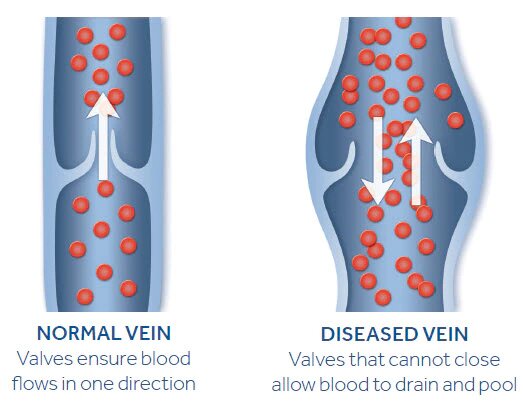Varicose Veins
Varicose Veins are typically surface veins that are enlarged, twisted, swollen and/or bulging. Sometimes these dilated veins may not even be visible because they can lie beneath the skin. Factors such as age, genetics, pregnancy, and prolonged standing or sitting can increase the risk of developing varicose veins.
They can be due to underlying venous reflux disease which can be progressive. This means that symptoms can worsen over time if left untreated.
Symptoms
Aching pain/Cramping
Fatigue/Heaviness
Swelling/Lymph edema
Inflammation/Phlebitis
Leg distortion/Itching Skin
Spontaneous bleeding
Blood Clots (DVT)
- If you experience any of the above symptoms, call 713-935-978.
- Take an online survey.
Causes of Varicose Veins
They are a relatively common condition, and for many people they are a family trait. Women are at least twice as likely as men to develop them. In the U.S. alone, they affect about 23% of all Americans. Many other conditions can predispose people to form varicose veins. The most common are family history, age, female gender, multiple pregnancies, obesity, lack of exercise and career choice. In this disease, the valves are malfunctioning and not working properly. This causes the blood to pool in the vein and makes it difficult for the muscles to push the blood towards the heart. Instead of flowing from one valve to the next, the blood continues to collect in the vein, increasing venous pressure and the likelihood of blockage while causing the vein to enlarge and form varicose veins.

Varicose veins can be caused by a variety of factors, including:
- Genetics – If you have a family history of varicose veins, you may be more likely to develop them.
- Age – As we get older, our veins can weaken and lose elasticity, making them more prone to becoming varicose.
- Gender – Women are more likely to develop varicose veins than men, partly due to hormonal changes that occur during pregnancy and menopause.
- Prolonged standing or sitting – Jobs or activities that require long periods of standing or sitting can put extra pressure on the veins in your legs, increasing the risk of developing varicose veins.
- Obesity – Being overweight or obese can put extra pressure on your veins, making them more likely to become varicose.
- Pregnancy – During pregnancy, the increased pressure on the veins in the pelvis and legs, as well as hormonal changes, can lead to the development of varicose veins.
- Injury or trauma – A previous injury or trauma to the legs can increase the risk of developing varicose veins.
If you are experiencing symptoms of varicose veins, it’s important to consult with a healthcare provider to determine the underlying cause and the best course of treatment.
Treatment
Treatment options include lifestyle changes, compression stockings, radio frequency ablation, venaseal, sclerotherapy and microphlebectomy. Often a combination of these modalities are used to achieve optimal results.
Visit Us at: 1140 Business Center Dr #403, Houston, TX 77043.
If you’re wondering that which varicose veins treatment will be best for you then that can be decided after a screening of your existing condition.
If you are looking for varicose veins treatment in Houston, Texas, book your appointment now.
